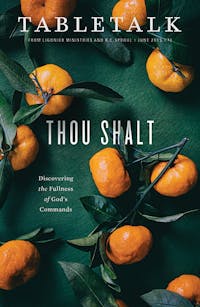
Request your free, three-month trial to Tabletalk magazine. You’ll receive the print issue monthly and gain immediate digital access to decades of archives. This trial is risk-free. No credit card required.
Try Tabletalk NowAlready receive Tabletalk magazine every month?
Verify your email address to gain unlimited access.
The Bible begins with the living God creating living things. All things are from Him and through Him and to Him (Rom. 11:36). All of life owes its existence to Him. He animates everything. In short, He is the God of life, a God who is alive and who begets living things. Even when the devil tried to thwart His life-giving display by introducing death—spiritual and physical—God overcame it through Jesus. In Him was life (John 1:4) and that life was like the dawning of a new day shining light to all men and making the darkness of the evil one pass away (1 John 2:8). In Jesus and by His powerful resurrection to life, God is breathing fresh life into a dark and fallen world (2 Cor. 5:17).
All of that is behind the two words and six constants in the Hebrew text of Exodus 20:13. There it reads as simply as it does in our English Bibles and with striking brevity: “You shall not murder.” Of the three Hebrew words used in Holy Scripture to describe the loss of life, the one in Exodus 20:13 is used most rarely and is much more specific. Normally when it is used, though not always, it is in reference to what we call “murder.” Murder is not merely the taking of someone’s life but the taking of someone’s life unjustly. This, of course, means that not all killing is forbidden. There are cases such as self-defense, just war, capital punishment, and others when taking a life is not just permitted but required.
To unjustly take a life is to do the devil’s business. It is to introduce death into a place it doesn’t belong. It is to work contrary to the way God works.
Speaking of God’s work, this commandment also directs us positively. Not only are we not to take one’s life unjustly, but we are also to labor with God for the preservation, protection, and promotion of life. Westminster Shorter Catechism Q&A 68 puts it like this: “What is required in the sixth commandment? The sixth commandment requires all lawful endeavors to preserve our own life, and the life of others.” Likewise, John Calvin presses this point upon his readers in his Institutes of the Christian Religion:
We are accordingly commanded, if we find anything of use to us in saving our neighbors’ lives, faithfully to employ it; if there is anything that makes for their peace, to see to it; if anything harmful, to ward it off; if they are in any danger, to lend a helping hand.
Because God is the God of life, and because we are His children and those who walk in the same way in which He walks (1 John 2:6), we are necessarily those who work for the preservation, protection, and promotion of life. This command, then, is profoundly rooted in the nature of God.
It is, however, also rooted in the nature of humanity. Humanity is by nature made in the image of God. Humans reflect God in ways that animals and plants do not. Therefore, they deserve a different degree of respect and even reverence than anything else in creation. A human being’s life is not to be cheaply or flippantly taken.
Since humans are created in the image of God, we are, in a very broad and general sense, members of one family in covenant with one another. “Man is both the image of God, and our flesh. . . . And if we do not wish to renounce our humanity, we ought to cherish his as our flesh” (Calvin). To unjustly take the life of a member of our community is in a way to snuff out a small piece of ourselves; it is like taking the life of a member of our own family.
Still deeper, Jesus appeals to this commandment and teaches us that this relates not only to the restraint of our hands but also to the restraint of our hearts.
You have heard that it was said to those of old, You shall not murder; and whoever murders will be liable to judgment. But I say to you that everyone who is angry with his brother will be liable to judgment; whoever insults his brother will be liable to the council; and whoever says, “You fool!” will be liable to the hell of fire. (Matt. 5:21–22)
It is in the mind and heart that murder is conceived. “See whether you can be angry against your brother without burning with desire to hurt him” (Calvin). To follow this commandment is to live in the peace and joy of unity and reconciliation.
We cannot ever think of taking the life of another unjustly without thinking of Christ, whose life was lost at the hands of wicked and unjust men. The requirement to preserve, protect, and promote life was wholly set aside as they crucified our Savior. And yet, God was at work there satisfying His wrath against sin and upholding His justice to forgive murderous sinners like us who have unjustly taken the lives of others with our words and in our hearts and by our hands. And it’s this grace that motivates us to be a people of life, working with all that is within us to preserve and to protect and to promote life to the glory of God.
